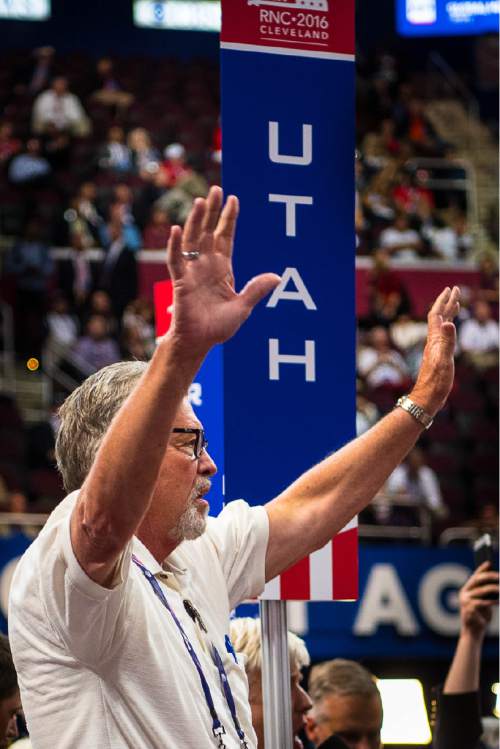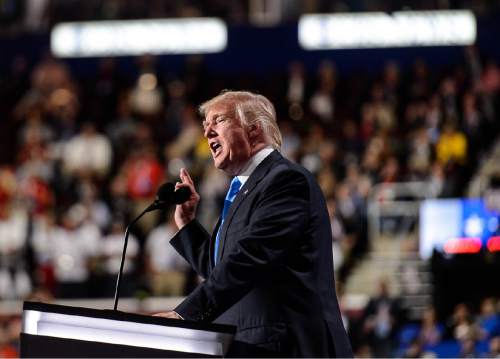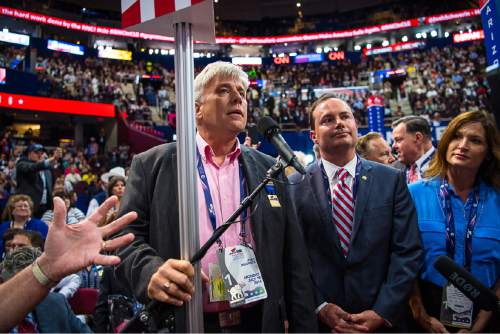This is an archived article that was published on sltrib.com in 2016, and information in the article may be outdated. It is provided only for personal research purposes and may not be reprinted.
Cleveland • Members of the Utah delegation to the Republican National Convention woke up early Wednesday morning and traveled to Kirtland, Ohio, once the headquarters of The Church of Jesus Christ of Latter-day Saints before members of the faith were driven west.
Today, members of that once-ostracized religion are hard-pressed to reconcile their ancestor's history with Republican nominee Donald Trump's calls for banning Muslim immigrants.
It's just one reason that Trump is struggling to win support among Mormon voters, a dramatic lack of support from a normally reliable Republican voting bloc that is hindering Trump in Utah and could prove more costly in battleground states with large LDS populations like Nevada and Arizona.
"A lot of us consider ourselves religious minorities. A lot of us belong to a church whose members were ordered exterminated on Oct. 27, 1838, and are sympathetic to other religious minorities," said U.S. Sen. Mike Lee. "When people speak in terms of religious intolerance, it understandably frightens us."
After Trump proposed banning Muslims from entering the country, the [Mormon] church issued a statement affirming its neutrality in elections, with an unusual caution that "it is not neutral in relation to religious freedom," pointing to statements by church founder Joseph Smith supporting religious liberty.
In 2012, Mitt Romney won 78 percent of the LDS vote nationally, according to exit poll data from the Pew Research Center. Eight years earlier, George W. Bush won over 80 percent of Mormon voters.
According to a poll last month for The Salt Lake Tribune, just 41 percent of Utah Mormons said they would vote for Trump.
Delegate Ryan McCoy of South Jordan said he supports border security, but the Mexican border wall — the centerpiece of Trump's immigration policy — and some of the rhetoric he has used when discussing immigrants strikes McCoy and other Mormons as intolerant.
A convention speaker on Monday night told about how his son was killed by an "illegal alien" from Guatemala, where McCoy served his mission.
He said Mormons who have served in other countries may have a different perspective on immigrants. "These are our friends and neighbors and it just feels like there's a tone from the Trump campaign that is anti-immigrant, and I think that's really something that has been tough for a lot of Utahns to swallow, regardless of if they're Mormon or not."
Trump's brash swagger is also problematic for Utah Mormons.
"Look, people who play church basketball end up with terrible injuries. They're always breaking legs and ankles and on crutches. With that exception, Mormons are generally nice," said Bountiful delegate David Harmer. "They don't swear at each other, they don't gratuitously insult people. … Unfortunately, the nominee seems incapable of avoiding offense."
Stefani Stone Williams, a delegate from Toquerville, said it's Trump's "whole demeanor" that turns off Utah Mormons.
"Conservative LDS, they care about moral issues and the Constitution, and Trump hasn't demonstrated that he knows what the Constitution says," said Williams. "Then there's the morality, the adultery, the womanizing, the character issues."
Former House Speaker Dave Clark, a convention delegate from Santa Clara, said he thinks Utah Mormons will come around and vote for Trump, mainly because there is such distaste for Hillary Clinton.
"He's cut from a different cloth," Clark said of Trump. "Very outspoken. I think a lot of our culture in Utah is more passive-aggressive. Trump is a typical New Yorker."
Twitter: @RobertGehrke







